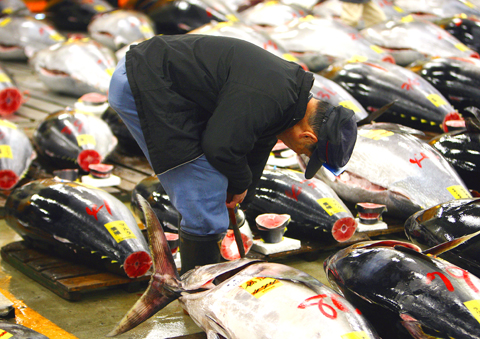A huge bluefin tuna was sold for US$176,000 in the first auction of the year at a Tokyo fish market yesterday, amid growing pressure on Japan to help save the threatened fish.
The 232.6kg bluefin tuna — caught off Japan’s northern region of Aomori — fetched a winning bid of ¥16.28 million (US$176,000), said an official at the Tsukiji fish market.
It was the second-biggest such bid yet, after a record ¥20.02 million paid for a bluefin tuna in 2001, the official said.

PHOTO: BLOOMBERG
The fish was bought by a pair of Japanese and Hong Kong sushi restaurant owners who had also made a joint top bid for a bluefin tuna in the first auction of last year at Tsukiji, the world’s biggest fish market.
“I want to make an impact on the Japanese and Hong Kong economies by buying the highest-priced tuna,” the Sankei Shimbun daily’s Web site quoted the Hong Kong sushi restaurant owner as saying.
The auction came amid worries among Japanese, the world’s biggest consumers of bluefin tuna, about growing calls for a trade ban for the fish, which environmentalists warn is on its way to extinction.
In a move to protect the species, an international body meeting in Brazil in November agreed to cut the allowable bluefin tuna catch in the eastern Atlantic and Mediterranean by about 40 percent this year compared with last year.
Japan, which consumes more than 80 percent of tuna caught in the Mediterranean, endorsed the proposal and agreed to reduce its own catch quota accordingly.
“Tuna is a precious food, which is the core of Japanese food culture,” said Keiichi Suzuki, president of the Tsukiji fish market, where 2,280 tuna fish were auctioned yesterday.
“We would like to provide a stable supply while saving resources,” he said as a crowd of bidders clapped to celebrate this year’s first auction, with an opening bell echoing through the pre-dawn market.

The paramount chief of a volcanic island in Vanuatu yesterday said that he was “very impressed” by a UN court’s declaration that countries must tackle climate change. Vanuatu spearheaded the legal case at the International Court of Justice in The Hague, Netherlands, which on Wednesday ruled that countries have a duty to protect against the threat of a warming planet. “I’m very impressed,” George Bumseng, the top chief of the Pacific archipelago’s island of Ambrym, told reporters in the capital, Port Vila. “We have been waiting for this decision for a long time because we have been victims of this climate change for

Rainfall is expected to become more widespread and persistent across central and southern Taiwan over the next few days, with the effects of the weather patterns becoming most prominent between last night and tomorrow, the Central Weather Administration (CWA) said yesterday. Independent meteorologist Daniel Wu (吳德榮) said that based on the latest forecast models of the combination of a low-pressure system and southwesterly winds, rainfall and flooding are expected to continue in central and southern Taiwan from today to Sunday. The CWA also warned of flash floods, thunder and lightning, and strong gusts in these areas, as well as landslides and fallen

MASSIVE LOSS: If the next recall votes also fail, it would signal that the administration of President William Lai would continue to face strong resistance within the legislature The results of recall votes yesterday dealt a blow to the Democratic Progressive Party’s (DPP) efforts to overturn the opposition-controlled legislature, as all 24 Chinese Nationalist Party (KMT) lawmakers survived the recall bids. Backed by President William Lai’s (賴清德) DPP, civic groups led the recall drive, seeking to remove 31 out of 39 KMT lawmakers from the 113-seat legislature, in which the KMT and the Taiwan People’s Party (TPP) together hold a majority with 62 seats, while the DPP holds 51 seats. The scale of the recall elections was unprecedented, with another seven KMT lawmakers facing similar votes on Aug. 23. For a

All 24 lawmakers of the main opposition Chinese Nationalists Party (KMT) on Saturday survived historical nationwide recall elections, ensuring that the KMT along with Taiwan People’s Party (TPP) lawmakers will maintain opposition control of the legislature. Recall votes against all 24 KMT lawmakers as well as Hsinchu Mayor Ann Kao (高虹安) and KMT legislative caucus whip Fu Kun-chi (傅崐萁) failed to pass, according to Central Election Commission (CEC) figures. In only six of the 24 recall votes did the ballots cast in favor of the recall even meet the threshold of 25 percent of eligible voters needed for the recall to pass,